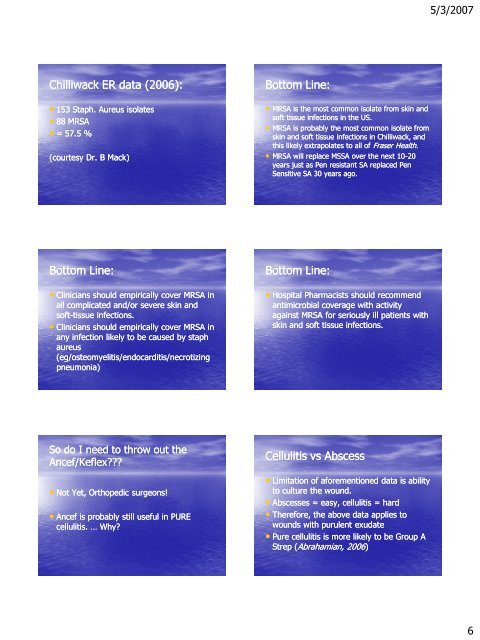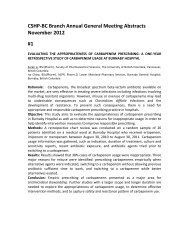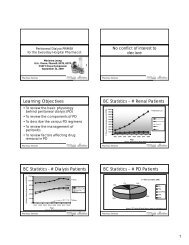MRSA (methicillin resistant staph areus) - CSHP-BC Branch
MRSA (methicillin resistant staph areus) - CSHP-BC Branch
MRSA (methicillin resistant staph areus) - CSHP-BC Branch
You also want an ePaper? Increase the reach of your titles
YUMPU automatically turns print PDFs into web optimized ePapers that Google loves.
5/3/2007Chilliwack ER data (2006):Bottom Line:• 153 Staph. Aureus isolates• 88 <strong>MRSA</strong>• = 57.5 %(courtesy Dr. B Mack)• <strong>MRSA</strong> is the most common isolate from skin andsoft tissue infections in the US.• <strong>MRSA</strong> is probably the most common isolate fromskin and soft tissue infections in Chilliwack, andthis likely extrapolates to all of Fraser Health.• <strong>MRSA</strong> will replace MSSA over the next 10-20years just as Pen <strong>resistant</strong> SA replaced PenSensitive SA 30 years ago.Bottom Line:• Clinicians should empirically cover <strong>MRSA</strong> inall complicated and/or severe skin andsoft-tissue tissue infections.• Clinicians should empirically cover <strong>MRSA</strong> inany infection likely to be caused by <strong>staph</strong>aureus(eg/osteomyelitis/endocarditis/necrotizingpneumonia)Bottom Line:• Hospital Pharmacists should recommendantimicrobial coverage with activityagainst <strong>MRSA</strong> for seriously ill patients withskin and soft tissue infections.So do I need to throw out theAncef/Keflex???• Not Yet, Orthopedic surgeons!• Ancef is probably still useful in PUREcellulitis. … Why?Cellulitis vs Abscess• Limitation of aforementioned data is abilityto culture the wound.• Abscesses = easy, cellulitis = hard• Therefore, the above data applies towounds with purulent exudate• Pure cellulitis is more likely to be Group AStrep (Abrahamian, 2006)6








